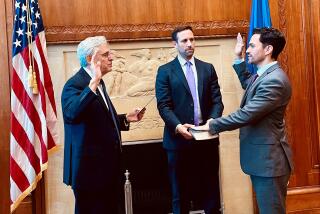Senate Democrats Blast Civil Rights Enforcer’s Record
- Share via
WASHINGTON — Amid sharp attacks on his role as the Reagan Administration’s chief opponent of mandatory school busing and job hiring quotas, Assistant Atty. Gen. William Bradford Reynolds opened his quest Tuesday for Senate confirmation to the Justice Department’s third-highest post.
Reynolds, staunchly defending his record before the Senate Judiciary Committee, asserted that if confirmed as associate attorney general he would continue to seek “justice for all.”
But several Democratic critics lambasted him, including Sen. Edward M. Kennedy of Massachusetts, who called Reynolds “the architect of most, if not all, of the Administration’s retreats on civil rights.”
Perhaps the harshest criticism of Reynolds’ actions, in cases ranging from voting rights to affirmative action, came from Sen. Howard M. Metzenbaum. The Ohio Democrat peered quizzically at Reynolds after criticizing his approval of moving a Selma, Ala., voting booth out of a black neighborhood and said pointedly: “You’re intelligent. You appear to be a decent human being. And yet you come down in some of these cases on the side of the bigots.”
To Testify Again
Reynolds was the only witness during the daylong hearing, the first of two scheduled on his nomination. He will testify again today, along with other witnesses. The committee could decide as early as Thursday on its recommendation to the full Senate, but Senate sources expect the committee to delay its vote a week.
The hearing, much like Reynolds’ four-year tenure as the nation’s civil rights enforcer, provided a forum for judgment of the civil rights policies of the Administration. While liberal Democrats generally attacked Reynolds and the Reagan record, conservative Republicans, including Committee Chairman Strom Thurmond (R-S.C.), were more sympathetic.
A virtual log of civil rights issues was at the center of Reynolds’ testimony, including laws prohibiting discrimination in housing and education and the Administration’s efforts to provide tax breaks for Bob Jones University, which segregates its students.
At the same time, Reynolds became the focus of a debate on whether as assistant attorney general he had been too zealous in carrying out the Administration’s objectives, thereby misinterpreting the law.
Sen. Paul Simon (D-Ill.) accused Reynolds of having a “revisionist concept of civil rights,” adding that his “unique interpretation” of laws “threatens great harm to their effectiveness.” Simon told Reynolds he has “very grave reservations” about whether the Senate should approve the nomination.
Praised by Denton
But Sen. Jeremiah Denton (R-Ala.) called Reynolds “well qualified” for the promotion, adding that civil rights advocates, editorial writers and some of his Senate colleagues have been vocal but inaccurate in their criticism of the Justice Department official.
During the hearing, Reynolds repeatedly was called upon to defend the Administration’s efforts to reopen affirmative action cases involving consent decrees in 51 jurisdictions, including San Diego. The Administration has argued that the decrees, which include racial preferential quotas, were struck down by a Supreme Court decision upholding seniority rights of white firefighters in Memphis, Tenn.
The Justice Department has met stiff resistance from many localities in its effort to reopen the cases and no court has agreed to overturn a consent decree. Under intense questioning from Sen. Arlen Specter (R-Pa.), Reynolds said the Administration was “not going to pick fights” on the issue.
But when Specter asked if this meant that the Administration would not file any more challenges, he seemed to leave the door open, saying that if a jurisdiction under a consent decree containing quota provisions began hiring and promoting, “that might well require some additional litigation.”
More to Read
Get the L.A. Times Politics newsletter
Deeply reported insights into legislation, politics and policy from Sacramento, Washington and beyond. In your inbox twice per week.
You may occasionally receive promotional content from the Los Angeles Times.









